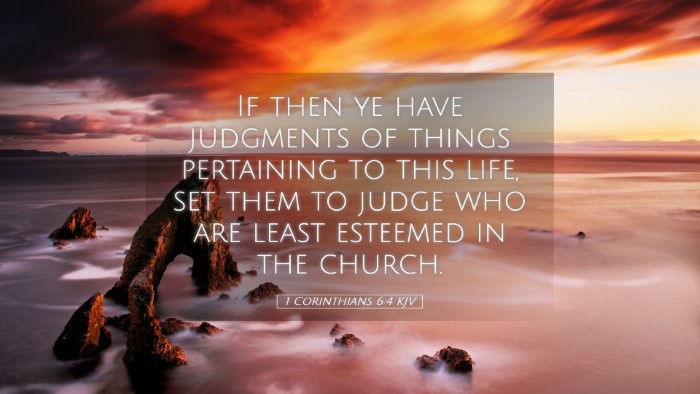Commentary on 1 Corinthians 6:4
The Apostle Paul, in his first letter to the church in Corinth, addresses several pressing issues that arose in the community. Among these topics, he discusses the matter of disputes and the role of the believers in resolving them. In 1 Corinthians 6:4, Paul writes:
"If then you have judgments of things pertaining to this life, set them to judge who are least esteemed in the church."
Contextual Background
The Corinthian church faced numerous challenges, including divisions, immorality, and disputes among its members. As a vibrant yet troubled congregation, the appeal to the early members was to find resolution within the church instead of taking conflicts to secular courts. In this verse, Paul emphasizes the importance of relying on godly wisdom in judicial matters, particularly for those who profess Christ.
Insights and Commentary
1. Spiritual versus Secular Judgments
According to Matthew Henry, the essence of Paul’s admonition is to discourage litigation among believers before non-believers. He points out that taking issues to secular courts implies a failure to love one another as commanded by Christ.
2. The “Least Esteemed” in the Church
Albert Barnes notes that Paul suggests appointing the least esteemed or the least official members in the church to resolve disputes. This perspective emphasizes humility and the value of wisdom over status. The “least esteemed” are not to be disregarded in their capacity to discern truth and justice among believers, as they possess the Spirit of God, who grants insight beyond human understanding.
3. The Role of Wisdom in the Church
Adam Clarke articulates how Paul’s instruction indicates that all believers should be engaged in the process of discernment and wisdom. The notion here is not about minimizing judicial matters but enhancing the capacity of the body of Christ to administer justice in love and grace. Clarke emphasizes that the wisdom and guidance from the Holy Spirit are crucial in reaching just conclusions without the involvement of secular authority.
4. The Nature of Christian Community
The verse sheds light on the fundamental nature of Christian community as one where love and mutual respect should govern interactions. Paul’s directive helps protect the church's integrity and witness to the world. Matthew Henry
5. Reflecting Christ in Disputes
Albert Barnes further explains that resolving conflicts among members of the church illustrates a commitment to living as a reflection of Christ's love and justice. By choosing to navigate disputes with brotherly love and spiritual discernment, believers demonstrate the gospel’s transformative power in their lives.
Concluding Thoughts
In summary, 1 Corinthians 6:4 serves as a profound reminder for all believers to seek resolution of their issues within the community of faith. The insights from Matthew Henry, Albert Barnes, and Adam Clarke collectively encourage pastors, students, theologians, and scholars to:
- Prioritize spiritual resolution over secular litigation.
- Recognize the value and capability of all members in mediating disputes.
- Trust in the Holy Spirit's guidance in achieving just outcomes.
- Maintain the integrity and witness of the church before a watching world.
- Reflect Christ through acts of love and discernment in difficult situations.


